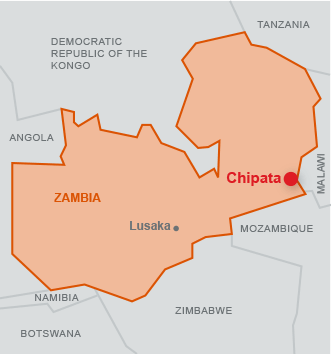
The Chiziro Ethembeni (Place of Hope) School was founded in 2010 by families from a rural community. The primary school is located seven kilometres outside Chipata, the capital city of the Eastern Province of Zambia. The location amid scattered farms significantly shortens the children's journey to school. Together with a simple nutrition programme, this has led to constantly rising school enrolment rates. The equal education fund (EEF) supported the school from 2014 until its promotion to a state primary school in 2019. Since then, the school has been financed by the Zambian Ministry of Education and can accommodate 500 children.
Background
In Chiziro, scattered farms form a village community. Before the Chiziro Ethembeni School was built, most of the children did not attend school as the schools were located at too great a distance. In addition, many parents in the village preferred their children to work on the farm as not much importance was placed upon their children receiving an education. With the foundation of the Chiziro Ethembeni School this view held by the parents gradually changed. The shorter distance to school combined with a healthy daily lunch for the pupils, convinced increasing numbers of farming families and parents that indeed an education for their children was both important and achievable. To support this process, and in addition to the education of the children, the school management also provided evening classes for the parents.
Project goals
Initially, the main objective was to enable children from the Chiziro community to access a local primary school and receive an education. This had previously proven to be extremely difficult and unlikely as the existing schools were located too far away from the villages. The aim was to supplement the regular lessons, and provide a holistic education, by adding to the curriculum work in the vegetable garden, a nutrition programme, the cultivation of traditional art and a leisure programme. The intention was that even after our support had ended, this holistic educational programme would continue in Chiziro.
Project development
In 2010 parents in the community of Chiziro began to teach a handful of children under a mango tree. Little by little they built up an infrastructure for the school. They were joined by young adults with a secondary school diploma who worked as teachers. Together with the parents they worked out the legal basis for a community school. From 2014, the equal education fund (EEF) helped to improve the quality of education. Teachers were given the opportunity for further training. The children were offered nutritious meals. Investments were also made in sanitary facilities. This improved the health of the pupils. The Chiziro Ethembeni School thus developed into a real community centre. Since then the children have been offered games, fun and creative activities. At the school they receive medical care and the community members gather for meetings.
All these actions led to an increase in the number of school enrolments to just under 500 by 2019. It is most remarkable that all primary school pupils were admitted to secondary school in the last two years. With these promotion rates, the Chiziro Ethembeni School achieved results comparable to those achieved in state schools.
In 2018, the community applied for the state to take over the school. This process was completed in 2019. The school now functions as entirely independent from external support. Thereby, the education of 500 children in Chiziro is secured in the long term. The EEF has achieved its goal.
Support from the EEF
The equal education fund (EEF) had followed the development of the Chiziro Ethembeni School since its beginnings in 2010. In 2014 it decided to support the school project. This enabled the EEF to help ensure access to schooling for around 500 children. Without the Chiziro Ethembeni School, they would have barely received any education. We also contributed toward the improvement of the quality of teaching. Thanks to the daily provision of meals, basic medical care and investments in sanitary facilities, the pupils' health has improved.
A decisive prerequisite for the success of this school was, and is, the commitment of the school management, community members and teachers. The EEF has been met with a receptive response from them with its proposal to strengthen the administrative and organisational skills of the local staff. The EEF thus created the basis for the Zambian state to take over and finance the running of the school. Chiziro Ethembeni is now a state primary school and the education of the children in this community is thus assured for the future.

Gallery
_gallery_teaser.jpg?lm=1584605545)
Zambia Chiziro Ethembeni School Picture Gallery 2019
view album
_gallery_teaser.jpg?lm=1572390034)
Zambia Chiziro Ethembeni School Picture Gallery 2018
view album
_gallery_teaser.jpg?lm=1572389906)
Zambia Chiziro Ethembeni School Picture Gallery 2017
view album
_gallery_teaser.jpg?lm=1572389770)
Zambia Chiziro Ethembeni School Picture Gallery 2016
view album
_gallery_teaser.jpg?lm=1572389640)
Zambia Chiziro Ethembeni School Picture Gallery 2015
view album
_gallery_teaser.jpg?lm=1572389542)
Zambia Chiziro Ethembeni School Picture Gallery 2014
view album
_gallery_teaser.jpg?lm=1572389417)
Zambia Chiziro Ethembeni School Picture Gallery 2013
view album
_gallery_teaser.jpg?lm=1572389340)
Zambia Chiziro Ethembeni School Picture Gallery 2012
view album
